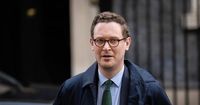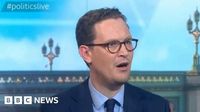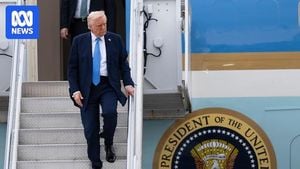In a recent episode of the BBC's Politics Live, Treasury minister Darren Jones found himself in hot water after making a controversial analogy comparing cuts to benefits for disabled people to reducing his children's pocket money. The comments, which were made while he defended government welfare cuts following the Spring Statement, have sparked outrage and prompted an apology from Jones.
Government analysis indicates that over three million families will be, on average, £1,720 a year worse off by 2030 due to these benefit cuts. Jones attempted to explain that the impact assessment did not account for additional support available for training and employment. He likened the situation to telling his children that he would cut their pocket money unless they secured a Saturday job, suggesting that the assessment only considered the loss rather than potential gains from employment.
However, his comments were met with immediate backlash. Critics branded the analogy as "tactless," "offensive," and "patronising." On Wednesday evening, Jones appeared on ITV's Peston programme to express his regret, stating, "I'm sorry about it. It was tactless and it wasn't well considered. I apologise if I've offended people." This admission came after Chancellor Rachel Reeves described the analogy as "not the right one" during an interview on LBC Radio.
Jones's remarks were not only criticized by opposition MPs but also drew ire from within his own party. Apsana Begum, the independent MP for Poplar and Limehouse, described the comments as "staggering," while Labour MP Rachael Maskell called them disgraceful, emphasizing that benefits serve as a "lifeline" for many individuals.
Further complicating the situation, the Spring Statement revealed that an estimated 800,000 people will lose out on personal independence payments (PIPs) by 2030. Additionally, a further 2.25 million individuals currently receiving the health top-up to universal credit will see an average loss of £500 a year due to a freeze on these payments. Meanwhile, about 3.9 million households not on the health element of universal credit are expected to gain an average of £265 a year from an increase to the standard allowance.
Jones defended the government's plans, arguing that the impact assessment does not account for the benefits of additional funding aimed at supporting those with disabilities into employment. He stated, "My understanding is what the impact assessment doesn't account for is the benefit that you get from our additional money into support for training, skills or work." However, critics pointed out that such arguments do not mitigate the immediate financial hardships that many families face due to the cuts.
In a related incident during a recent episode of BBC Question Time, Jones was confronted by a father of a disabled daughter who expressed concern over the impending cuts. The father questioned how the government could justify pay rises for MPs while implementing cuts that would adversely affect vulnerable individuals. He stated, "You’re taking it from my daughter and you put it in your pocket. That’s how she sees it." Jones admitted that the situation was "awkward" given the government's welfare cuts, especially as MPs are set to receive an inflation-busting 2.8% pay rise this year, bringing their salaries to nearly £94,000.
The Independent Parliamentary Standards Authority (IPSA), which was established in the wake of the 2009 expenses scandal, justified the pay rise as a reflection of the "vital role" of MPs. However, the juxtaposition of MPs receiving pay increases while cuts are made to welfare benefits has raised significant public concern and dissatisfaction.
In the wake of the backlash, Jones's comments have ignited discussions about the government's approach to welfare reform and the perceived disconnect between policymakers and the realities faced by those reliant on benefits. As the government pushes forward with its plans, it remains to be seen how these changes will impact the most vulnerable in society.
Despite the government's insistence that the reforms are necessary for economic sustainability, critics argue that the implications for disabled individuals and their families are dire. The prospect of pushing an additional 250,000 people, including 50,000 children, into relative poverty due to these changes has raised alarm bells among advocacy groups and opposition parties alike.
As the debate continues, it is clear that the government's welfare policies will remain a contentious issue in the upcoming political discussions. The challenge now lies in balancing fiscal responsibility with the need to support those who are most in need, ensuring that the voices of the vulnerable are heard amid the ongoing economic discourse.







